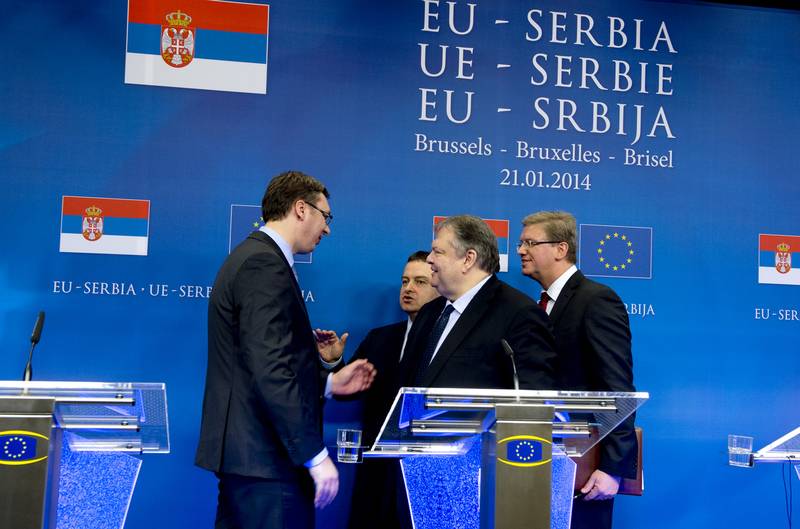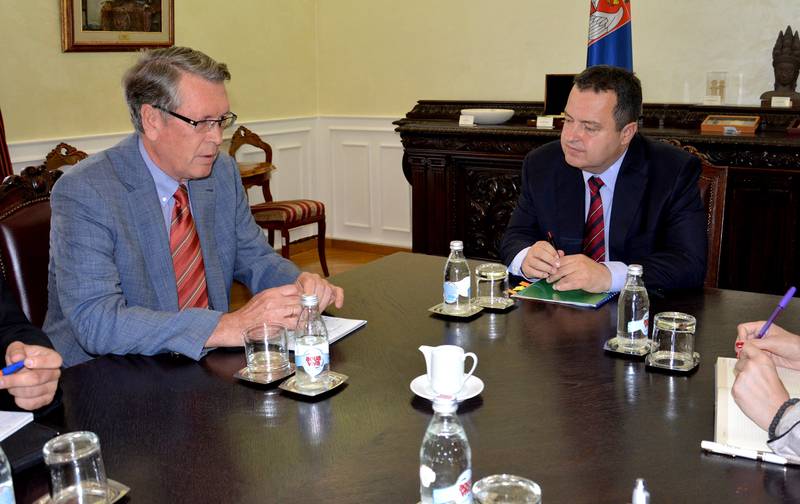Serbia - the Balkan Ukraine
Adelina Marini, August 29, 2014
 If Serbia becomes part of the EU, Russia will lose its influence in the Balkans or, at least, it will be significantly limited. Moscow is not ready to allow that and is actively working to prevent it. EU, however, is too busy with itself, the Eastern crisis, the problems in the Middle East, Iraq and Syria to pay relevant attention on the enlargement process toward the Western Balkans. And although the EU and especially Germany state they have an irrevocable commitment to the countries from the region, at this stage it seems Russia is winning the big and long-term battle. While the EU is on vacation and is awaiting the new high representative for foreign affairs, the Russian ambassador is not resting in Belgrade. The meetings of high officials from the Serbian government with Alexander Chepurin are quite frequent, as well as his interviews with Serb media, come to focus against the backdrop of the rare European activities in the region.
If Serbia becomes part of the EU, Russia will lose its influence in the Balkans or, at least, it will be significantly limited. Moscow is not ready to allow that and is actively working to prevent it. EU, however, is too busy with itself, the Eastern crisis, the problems in the Middle East, Iraq and Syria to pay relevant attention on the enlargement process toward the Western Balkans. And although the EU and especially Germany state they have an irrevocable commitment to the countries from the region, at this stage it seems Russia is winning the big and long-term battle. While the EU is on vacation and is awaiting the new high representative for foreign affairs, the Russian ambassador is not resting in Belgrade. The meetings of high officials from the Serbian government with Alexander Chepurin are quite frequent, as well as his interviews with Serb media, come to focus against the backdrop of the rare European activities in the region.
It is true that lately the situation has been changing but the steps are too cautious and too late. Serbia is currently split between its strategic national goal to become a fully fledged member of the EU by the end of this decade and is working tirelessly to achieve it. In the same time, though, it does not want to be forced to choose between EU and Russia. Since the situation in Ukraine deteriorated, the statements of high Serb officials that Serbia wants in the EU but in the same time wants to keep its special relations with Russia come on a daily basis. Beyond the purely emotional reasons, which are difficult to prove nowadays, Serbia also has some serious economic reasons to avoid being in the epicentre of the geopolitical battle.
The main reason why Serbia avoids taking a side in the conflict between the West and Russia is that it is highly energy dependent and Moscow does not miss a chance to remind Belgrade that a friendship is a friendship but cheese (oil/gas) is with money. This is the same approach Moscow used in a very "family, brotherly and friendly" way with Ukraine. Russia owns 56.5% of the Serb state-owned oil company Naftna Industrija Srbije (NIS) under a privatisation contract from 2008 which goes in a package with Serbia's commitment for South Stream. Belgrade sold initially 51% of the NIS shares to Gazprom for 400 million euros, ensuring also Moscow's commitment to invest another 500 million euros in modernising the oil refinery in Pancevo and in filling the gas storage Banatski dvor.
It is not a coincidence that Alexander Vucic's government has established an enquiry committee to check whether all the contracts concluded with Gazprom are in Serbia's interest. The situation is very similar to an investigation of gas delivery contracts, concluded by Ukraine's former prime minister Yulia Tymoshenko, launched by the former president Yanukovych who later escaped in Russia. The goal, of course, was never to see if the Ukrainian interest was protected but to destroy any possible opposition in Ukraine. There are fears that Prime Minister Vucic is concentrating the entire power in his hands, as Sonja Biserko, head of the Helsinki Committee in Serbia, said in Dubrovnik recently. According to her, all symptoms for a strong concentration of power are available in Serbia - a weak parliament, weak opposition and dependent media.
For months, there have been two issues that make the headlines in Serb media: exchanges of fire between the ruling party and the Democratic Party of Serbia, led in the past by former president Boris Tadic, and pressure on Serbia to (not)impose sanctions on Russia. If the situation remains as it is in terms of the Serb ambitions to begin accession negotiations with EU and a fast as possible accession in the EU, then the Tymoshenko scenario seems highly unlikely. The question is whether the situation will remain the same.
What does Serbia want?
Alexander Vucic's government, albeit going toward a single-man rule, seems determined to open key negotiation chapters - most of all 23 and 24. This, according to him and the members of his cabinet, will be the first huge test through which Serbia wants to demonstrate that it is ready. If the EU does not respond to these huge expectations, there is a big probability the country to fall into the Turkish syndrome - to stop striving for European integration and instead implement reforms according to its own liking. The risk this to happen is huge because Serbia suffers, not since yesterday, of a huge dose of nationalism and the anti-European lobby is still alive. It could get additional boost if the EU fails to show that it is a better choice than a friendship with Russia.
Second, for Serbia it is very important to find a way to repair its economy. The government seems completely aware of the reforms that need to be done and the European semester will, for sure, prove a reference point. The reforms that need to be done are painful and long overdue. The EU should offer some kind of a "sweetener". The economy in the region was outlined as the most important priority for the Western Balkans during Croatia Forum in Dubrovnik and it seems that Germany has heard the message (the German chancellor attended in Dubrovnik this year the Brdo-Brijuni process summit with the countries in the region), because on 28 August, in Berlin, a summit dedicated on the Western Balkans took place with a main focus namely on the economy.
Serbia's third problem is that it is under pressure to choose. In the past week, the top story in Serb media was the EU démarche demanding Serbia to refrain from taking advantage of the sanctions against and by Russia. Something Moscow is strongly advising. In one of his interviews recently, Ambassador Alexander Chepurin said that Serbia's options for export are huge. "Space is being vacated  on the Russian market, held so far by big western companies. Serbia could take their place, especially in terms of export of meat, dairy products, vegetables and fruit", Mr Chepurin said.
on the Russian market, held so far by big western companies. Serbia could take their place, especially in terms of export of meat, dairy products, vegetables and fruit", Mr Chepurin said.
To the EU, it is of utmost importance Serbia to be part of it because, otherwise, it will continue to be a source of tensions and serious problems. The moment is more than appropriate because the current Serb government has demonstrated unknown so far readiness to tear apart with its past and open a new page in its history. Russia has already made it clear that it has no intention to back off. Serbia is the perfect weak link - it has not yet started the long path toward integration and does not have much to lose. That is why, it is essential how will the EU play out the Serbian card.
It is self evident that the current policy of enlargement is inapplicable in this case. The Union has to find another approach toward Belgrade, mainly focused on removing the Serb economic dependence on Russia and showing readiness to absorb the shocks when Moscow decides to break its friendship with Serbia. This could include a real incorporation into the single market even before the negotiations have started. Only then Serbia can actually feel the advantages of EU membership. The single market should not be the prize for completed negotiations because it takes a lot of time and by then Moscow will have a huge strategic and historic advantage. The future EU high representative, the new enlargement commissioner and the member states should be aware that without Serbia there will never be stability in the Western Balkans and therefore in Europe. Moscow knows that very well and uses it while the EU is in vacation.
 Bakir Izetbegovic, Andrej Plenkovic | © Council of the EU
Bakir Izetbegovic, Andrej Plenkovic | © Council of the EU Aleksandar Vucic, Recep Tayyip Erdogan | © Serbian Presidency
Aleksandar Vucic, Recep Tayyip Erdogan | © Serbian Presidency Jean-Claude Juncker, Zoran Zaev | © European Commission
Jean-Claude Juncker, Zoran Zaev | © European Commission